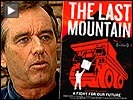
By Amy Goodman with Denis Moynihan
PARK CITY, Utah—This small, alpine mountain town is transformed every winter during the Sundance Film Festival into a buzzing hive of the movie industry. While much of the attention is focused on the celebrities, Sundance has actually become a key intersection of art, film, politics and dissent. It is where many of the most powerful documentaries premiere, films about genuine grass-roots struggles, covering the sweep of social justice history and the burning issues of today. They educate and inspire a growing audience about the true nature, and cost, of direct democracy.
“The Last Mountain” is a documentary about the threat to Coal River Mountain in West Virginia, which is slated for destruction by mountaintop-removal coal mining, one of the most environmentally devastating forms of mining being practiced today. The worst offender is the coal giant Massey Energy and its former CEO, Don Blankenship. A broad coalition of activists from around the world has been active in trying to stop Massey, led by regular, working-class people from the surrounding towns and hamlets of Appalachia. Robert F. Kennedy Jr., a longtime environmentalist and lawyer, joined them in the fight and is featured in the film. I asked him about the struggle:
“This film is about the subversion of American democracy. Last year, the Supreme Court overruled a hundred years of ironclad American precedent with the Citizens United case, and got rid of a law that was passed by Teddy Roosevelt in 1907 that saved democracy from the huge concentrations of wealth that had created essentially a corporate kleptocracy during the Gilded Age, and Americans had forfeited their democracy during that time…. For the first time since the Gilded Age, we’re seeing those kinds of economic concentrations return to our country.”
Kennedy describes the subversion by corporate power of the press, the courts, and Congress and state legislatures: “The erosion of all these institutions, I think, of American democracy have forced people who care about our country, and who care about civic health, into this box of civil disobedience and local action.”
This is a historic month for Robert Kennedy Jr.: It is the 50th anniversary of his uncle John Kennedy’s inauguration as president, and also of his father Robert Kennedy’s inauguration as U.S. attorney general. I asked him about those two, felled by assassins’ bullets:
“To me, the most important thing that John Kennedy did, and my father was trying to do, was to stand up to the military-industrial complex, which … President Eisenhower, in his final speech just before my uncle took the reins of power, said this is the greatest threat to American democracy in the history of our republic, ever: the growth of an uncontrolled military-industrial complex in combination with large corporations and with influential members of Congress, who would slowly but systematically deprive Americans of the civil rights and the constitutional rights that made this country an exemplary nation.”
In a moving moment here at Sundance, Kennedy, who had just flown in from the funeral of his uncle, Sargent Shriver (founder of the Peace Corps), came out after a screening of “The Last Mountain,” and was embraced by Harry Belafonte, himself the subject of the film that opened this year’s festival, the breathtaking biopic of the singer and activist called “Sing Your Song,” which is really a chronicle of the movements for racial and economic justice of the 20th century.
Belafonte was one of Dr. Martin Luther King Jr.‘s closest confidants. I spoke with Harry about his lifetime of activism, and about his feelings about President Barack Obama. He told me, “During his campaign for the presidency, he was talking before businessmen on Wall Street in New York. I said, ‘Well, you know, I hope you bring the challenge more forcefully to the table.’ And he said, ‘Well, when are you and Cornel West going to cut me some slack?’ I said, ‘What makes you think we haven’t?’”
Belafonte was a friend of Eleanor Roosevelt, who told him of an exchange between her late husband, President Franklin Roosevelt, and A. Philip Randolph, a key organizer of the 1963 March on Washington, and before that the major force behind the black train conductors’ union, the Brotherhood of Sleeping Car Porters. Randolph described what needed to happen to improve the condition of black and working people in the country. Roosevelt said he did not disagree with anything Randolph said. Retelling the story here to me at Sundance, Harry leaned back in his chair and repeated what Roosevelt told Randolph: “Go out and make me do it.”












Media Options